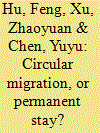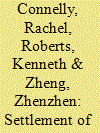| Srl | Item |
| 1 |
ID:
180700


|
|
|
|
|
| Summary/Abstract |
Circular labour migration from rural areas has emerged as a key feature of the Indian economy. Generally seen as a positive development, because of its impact of remittances on the household economy of the migrants, circular migration has also been associated with exploitation and unfreedom of the migrant labour. This paper focuses on labour out-migration to the construction sector from one of the economically backward districts of West Bengal, India. Firstly, it examines who participates in this migration process and highlights the nature of such migration. Secondly, it explores the outcomes of labour migration focusing on both the economic as well as the social dimensions. Thirdly, these outcomes are linked with the broader debates on the migration–development linkages. This paper argues that rather than focusing on the short-term and static gains of out-migration, there is a need to investigate the long-term, life-cycle implications of such circular labour migration.
|
|
|
|
|
|
|
|
|
|
|
|
|
|
|
|
| 2 |
ID:
103909


|
|
|
|
|
| Publication |
2011.
|
| Summary/Abstract |
Although there is a rich literature on internal temporary migration in China, few existing studies deal with the permanent migration decision of China's rural labor. This paper will fill this gap and deal with the permanent migration choice made by rural migrants with the China General Social Survey (CGSS) data. Our results show that compared with their circular counterparts, permanent migrants tend to stay within the home provinces and are more likely to have stable jobs and earn high incomes and thus are more adapted to urban lives. We also find that more educated and more experienced migrants tend to be permanent urban residents, while the relationship of age and the probability of permanent migration is inverse U-shaped. Due to the restrictions of the current hukou system and the lack of rural land rental market, those people with more children and more land at home are more likely to migrate circularly rather than permanently.
|
|
|
|
|
|
|
|
|
|
|
|
|
|
|
|
| 3 |
ID:
107485


|
|
|
|
|
| Publication |
2011.
|
| Summary/Abstract |
This paper considers economic models of migration in the context of current Chinese migration. We argue that using formally changing one's household registration (hukou) location is too narrow a definition of settlement for policy purposes. Instead we show that time in the city and co-residence with spouses and separately with children reveals systematic settlement behavior on the part of a subset of migrants. The empirical evidence offered is largely descriptive but shows that those migrants who were younger at the age of migration, who are currently married and self-employed spend more years in the city. Men who have been in the city longer and are self-employed are much more likely to be co-residing with their wife. Self-employment is also a predictor of co-residence with children for both mothers and fathers.
|
|
|
|
|
|
|
|
|
|
|
|
|
|
|
|